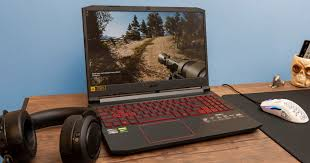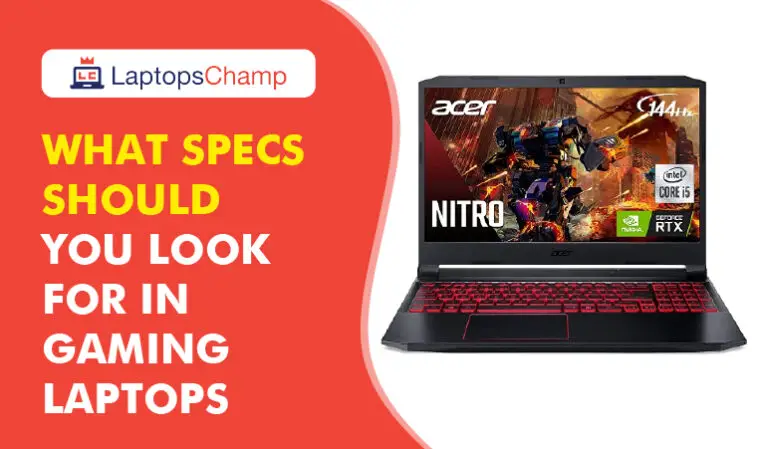This article may include references and links to products and services from one or more of our advertisers. We may be paid compensation when you click on links to those products and/or services. As an Amazon Associate, we earn from qualifying purchases.
This article contains affiliate links, which means that if you click on one of the product links and make a purchase, we may receive a commission. Please note that this article is for informational purposes only and should not be construed as financial or investment advice. We do not endorse any specific product or service mentioned in this article.
What Specs Should You Look for in Gaming Laptops?
You may encounter a variety of issues when purchasing a gaming laptop. The many terms for graphic card kinds and how they impact performance may be unclear to you. Maybe you’re unsure of which display panel to choose.
Or perhaps you’re not sure what separates DLSS from Ray Tracing. Use this helpful guide we’ve put together with all the advice you should bear in mind when buying a gaming laptop to find answers to these and other questions.
Did you know that 78% of American households have a desktop or a laptop? It goes to show that even with the best consoles around, playing on a laptop or desktop is still the optimal choice.
If you want to take your gaming experience to the next level, gaming laptops are great starting points. A gaming laptop offers portability while maintaining smooth gameplay thanks to its beefy specs.
| Image | Title | See Price |
|---|---|---|
 Top
Top
Top
Top | MSI GF63 THIN 9RCX-818 15.6" Gaming Laptop, Thin Bezel, Intel Core i7-9750H, NVIDIA GeForce GTX 1050 Ti, 8GB, 256GB NVMe SSD | See Price |
 Top
Top
Top
Top | Lenovo Legion Y7000 Gaming Laptop, 15.6" FHD IPS Anti-Glare Laptop (Intel Core i7-8750H Processor, Nvidia GTX 1060, 16 GB DDR4, 1 TB HDD + 128 GB PCIe SSD, Windows 10 Home) 81LF0001US, Black | See Price |
 Top
Top
Top
Top | Razer Blade 15 Gaming Laptop: Intel Core i7-8750H 6 Core, NVIDIA GeForce RTX 2070 Max-Q | 15.6" FHD 144Hz | 16GB RAM | 512GB SSD, CNC Aluminum, Chroma RGB Lighting, Thunderbolt 3 | See Price |
What Specs Should You Look for in Gaming Laptops?

Considering using your laptop to play some games? These are the qualities a gaming laptop should have. Even while you might not have access to your desktop PC’s advanced graphics, you can still play games on your laptop.
There are many laptops available with excellent graphics and sufficient power to run high-quality, visually stimulating games. However, there are a few key qualities you should look for in a gaming laptop if you want to get the most out of your laptop for gaming.
A good gaming laptop will feature a fast processor, a good battery life, a strong CPU, enough storage, and top-notch graphics cards. Any computer designed with gaming in mind must have these three components to function at its highest potential and handle all of the graphic and visual demands of different games without stuttering or lagging.
Gaming laptops are the premium choice of gamers and while buying a gaming laptop aforementioned specs are kept in mind. The only difference comes when it comes to gaming laptops or gaming PC. Buying a gaming laptop comes less with the choice of playing PC games or playing on a laptop.
Not all laptops designed contain powerful gaming laptops or high-end gaming laptops with a dedicated graphics card, a refined operating system, a laptop battery life, intel processors, good storage space, a backlit keyboard, multiple cores, and ray tracing that cater to gaming needs.
When it comes to most laptops the specifications vary but key features of gaming laptops cannot be compromised. Heavy games require the laptop built up in such a way that it can cater to the running of the games without disturbing any of the features of the laptop.
Many gaming laptops are usually powerful gaming laptops. Cooling systems, screen size, external storage, higher clock speed Nvidia g sync, and dedicated GPUs are a plus point along with higher resolutions. Together, all these features constitute the specs of modern gaming laptops.
In this guide, you’ll learn what to look for in a custom gaming laptop. Read on and find out what to look for:
-
Look for the Appropriate GPU
The graphics processing unit (GPU) on a laptop is what produces the pixels that make up the visuals you see on your game screen. It’s essential for enjoying fluid frame rates and high-resolution gameplay, along with your CPU.
A strong CPU and GPU are essential if you want to play games in 1440p or 4K. Running a game at 4K resolution, for example, results in more pixels being displayed on the screen.
Are gaming laptops worth it? It all starts with how much you’ll invest in a decent GPU. Some games will use the CPU, but the majority will rely on your GPU instead.
This should be your main decision driver. Right now, most gaming notebooks will either have Nvidia GeForce GTX or higher-end RTX GPUs (which come with ray-tracing capabilities).
For now, your choice of GPU depends on how hardcore you want to be. Here are some considerations:
Entry-Level Gaming
As its name implies, this gaming level won’t need games to be at their highest settings. It means getting a GPU that would let you play most games using its middling settings. With this in mind, you can get the best gaming laptop for under $1,000.
Mainstream Gaming
This gaming level requires you to play most games, even with high settings. A good example of a mid-tier GPU is Nvidia’s GeForce RTX 2060. Take note, that this is the minimum standard if you want to play virtual reality games.
If you own an HTC Vive or an Oculus Rift, this GPU should be the lowest you’re willing to go. In most cases, these laptops will cost around $1,000 to $1,500.
Hardcore Gaming With VR
At this gaming level, you’ll need beefy GPUs that let you play through anything using the highest settings. These enable you to have a smoother VR experience while enjoying the best special effects. With this, you can pump up effects using Nvidia Gameworks.
The starting price for these laptops is at the high end of $1,000. Depending on the other specs necessary, it can go well beyond $3,000. The price is worth it since you can play games at higher frame rates while enabling ray-tracing 4K resolution.
Feature Set of the GPU
Resolution and framerate.
Make sure the GPU and CPU of your gaming laptop can generate images at the right resolution for your screen or an external monitor while maintaining stable frame rates. To get an idea of how well they will run, compare the CPU and GPU in the laptop you are considering to the system requirements of the games you want to play.
the refresh rate for displays.
To fully take advantage of a 144Hz screen, if you’ve invested in one, you’ll need a GPU that can consistently deliver 144 FPS (or higher).
Tracing a ray.
Check the required benchmarks to determine the performance impact before enabling hardware-intensive rendering techniques like ray tracing technology.
-
Look at the CPU and RAM
Over 43% of American adults play video games using their computers. So, you aren’t alone in your quest of perfecting your gaming experience. With that, the CPU and RAM will play a huge role in determining your computer quality.
If you want the best central processing unit around, look for laptops using desktop-level CPUs. But since most games use the GPU more than the CPU, you can have a good gaming experience using something like a Core i5 processor. Also, you can’t upgrade CPUs in most cases, so consider saving money to get a top-of-the-line quad-core or Hexa-core processor.
The memory that temporarily stores data for quick retrieval by your CPU is known as random access memory or RAM. It resets if there is a power outage, unlike an SSD or HDD, but it also makes frequently used data accessible more quickly than a storage disc.
A PC can run more processes at once with more RAM, and it can switch between programs more quickly while background services are active.
Gaming can take a huge toll on your RAM, meaning you need 8GB as the minimum. To make your laptop a gaming computer, consider investing in 16GB RAM. The pleasant news is that even if you can’t get this RAM now, you can upgrade it in the future since it’s the easiest component to replace.
Storage is also another issue if you want a laptop specifically for gaming. Some budget options will only have a 1TB hard drive. But if you want to get the most out of your gaming performance, buy a gaming laptop with a small SSD for its boot drive.
It isn’t rare to see a combination of a 128GB SSD and 1TB HDD working together. If you get a bigger SSD, your loading times will get much shorter. The caveat is paying more, but this is easy to save for later since they’re also easy to upgrade.
-
Consider the Display Option
Gaming laptop displays will have different display setups. Some monitors will only have 1080p resolution panels but will enable refresh rates as high as 144Hz, 240Hz, or even 360Hz. To utilize these high refresh rate displays to their maximum potential, a strong GPU will also be needed.
As an alternative, you might choose high-resolution displays with a 60Hz refresh rate. These possibilities for displays range up to 4K panels.
This laptop screen component often gets overlooked, but its impact on your gaming experience is huge. If you aren’t using a separate monitor for your laptop, its built-in screen is all you have. The first thing you should think of is the size since most laptops will have 15-17″ screens.
The size is up to your preferences, whether you want an 18” screen or a measly 14” one. But with a larger screen, expect the laptop to be heavier and bigger. This consideration is important if you like gaming while on the go.
After the size, think about its resolution and refresh rate. Nowadays, the minimum resolution for gaming is 1920 x 1080, and anything less should make you run away. If you’re using beefy GPUs, consider getting better resolutions like 2560 x 1440 or even 4K (3840 x 2160).
Most gaming laptop manufacturers have a 60Hz display with a 1080p resolution. These are enough, but some brands will offer 144Hz or even 240Hz for a smoother gaming experience. But it’s better to top out at 60Hz unless you have a high-tier GPU.
-
Check the Battery Life
When choosing a modern gaming laptop, try not to place too much emphasis on battery life. Gaming devices are resource-intensive and frequently use more battery power when in use. Anything more might be asking too much from a good gaming laptop, which should be able to provide you with 8 hours of battery life when not in use. This shouldn’t matter too much, though, as you would often be using a gaming laptop in its performance or turbo mode while connected to a power source constantly.
Gaming computers will have better capabilities since they can handle more tasks compared to their general counterparts. But regardless, don’t count on your gaming notebook’s battery to keep your gaming experience consistent. That’s why it needs a constant power source to keep the GPU at peak performance.
No matter what new gaming laptop brand you choose, a gaming notebook only lasts for an hour or so for intense gaming. When performing other, less intensive tasks, you can extend it to a few hours. That’s why if you’re looking for a rig that can last 8 hours, you’re better off with a desktop.
Some laptops come with this capability, but it often sacrifices the quality of the display. It’s also unhealthy for you since playing pc games on a dim screen can damage your eyes.
-
Upgradability
As gaming can be taxing on your computer’s RAM, it will be important to consider if you will be able to upgrade it in the future. A desktop computer for gaming should have at least 16GB of RAM. If you’re shopping for a laptop, you might be able to get by with an 8GB RAM model, but it would be fantastic if you could upgrade to 16GB the next day.
-
Keyboard
On gaming laptops, a keyboard could be your primary input device, particularly if you want to play a lot of shooting or strategy games. Therefore, it is crucial to consider significant components like key travel, actuation, and support for features like anti-ghosting and n-key rollover (allowing you to press multiple buttons at once for combos and not miss out on any).
Key travel should ideally be between 1.5mm and 2mm. Look for keys that are just right—not too soft or hard to press. Regarding backlighting, the majority of gaming laptops have some sort of backlighting on the keys.
While the majority have a single red/white backlight, some have RGB lighting that can be customized for each part or key. These are useful for finding the correct keys in games and not only because they look cool.
-
Exceptional Mouse
Any gaming PC must have a mouse since it gives you control and flexibility in the game. Even though there are numerous brands and varieties of mice available, not all of them are created equal.
So what qualities should a gaming mouse have? Your best choice, if you’re looking for an excellent wireless gaming mouse, is to get one with programmable buttons and a sensitivity level of at least 3200 DPI or higher.
A high-quality wireless mouse will function well with the touchpad on your laptop and be less susceptible to lag-inducing interference from other devices. If you like the sensation of a wired mouse, you can choose that option as well.
Because they can’t be interfered with by other devices, wired mice have the advantage of being more dependable than wireless ones. Additionally, compared to wireless mice, wired mice typically exhibit greater responsiveness and accuracy.
-
Ports accessible
The ports that a gaming laptop offers are among the most crucial features to look for. To connect your laptop to various screens and fast internet connections, you must ensure that it has both an HDMI port and an Ethernet port.
To connect your controller and other peripherals quickly, you should also make sure it has Bluetooth capabilities.
Since port adapters are available, the machine’s ports shouldn’t add to its bulk. Nevertheless, crucial ports like USB and Type C ports
-
High-quality Speakers
Another crucial component of a gaming laptop is its speakers. A laptop with powerful speakers is a fantastic investment if you want to get the most out of your games. This will let you play your game without experiencing any lag or distortion and hear every sound effect and detail.
Your gaming experience’s general quality might also be impacted by the caliber of your speakers.
If your speakers aren’t high-quality, the sounds won’t be clear and crisp, which could be challenging for playing games that call for rapid reflexes or intense attention. For this reason, it is sensible to think about buying a laptop with powerful speakers for modern games
and gaming.
-
Storage
In the majority of areas that affect gaming, solid-state drives (SSDs) perform better than previous mechanical drives (HDDs). Without using any moving elements, SSDs read and write blocks of data electronically using a form of flash memory called NAND. A moving drive head is used to access mechanical platters in HDDs, which are spun by a motor.
High random read/write rates, which allow them to quickly retrieve data stored in various locations on the drive, are one of the main advantages of SSDs over HDDs. They typically load applications and information more quickly than a comparable-sized HDD and can speed up system startup.
SSDs last longer than standard HDDs since they don’t have moving parts and have procedures to balance wear across memory blocks.
Because their production costs are higher than those of comparable-sized HDDs, SSDs typically cost more per gigabyte. For storing huge files, some systems, therefore, have both an SSD and a high-capacity HDD, though newer laptops increasingly rely only on SSDs.
Key Features of Laptop Storage
-
SSD NVMe.
These drives replace the slower SATA interface with the faster PCIe connection, enabling faster random read/write rates and more throughput.
-
SSD SATA.
The same SATA connectors are used by these drives and conventional HDDs. They are often more dependable and speedier than HDDs, but slower than more recent NVMe SSDs.
-
Technology for Intel® OptaneTM memory.
A small NVMe-based solution called Intel® OptaneTM memory combines modern storage technology with intelligent memory that stores commonly used programs and files for quick retrieval. This technology is ideal for use as a boot drive because it is made to load important apps and data quickly.
-
External memory.
When onboard storage is at a premium, external hard drives or SSDs can offer cost-effective extra space.
Conclusion

How you intend to use most gaming laptops is most important when deciding which gaming laptop is ideal for you.
Prioritizing the CPU and GPU above a feature-rich built-in display may make sense if you want to game on an external monitor. 32GB of RAM, a reliable CPU, and a high-resolution monitor may be more crucial for content creators or video editors than the most recent GPU architecture.
It’s important to discover the characteristics you value the most and locate the budget gaming laptop that has them all, rather than simply comparing the parts and form factors of various gaming laptops.
When it comes to purchasing a suitable gaming laptop, there is a tonne of possibilities. These are some things you should consider when buying gaming laptops. Use these to get the most out of your money.
Use the aforementioned advice, though, and you’ll be more prepared the next time you browse the product page. So, which laptop did you ultimately decide to use for gaming? Have any more advice you’d want us to mention? Tell us in the comments section below.






